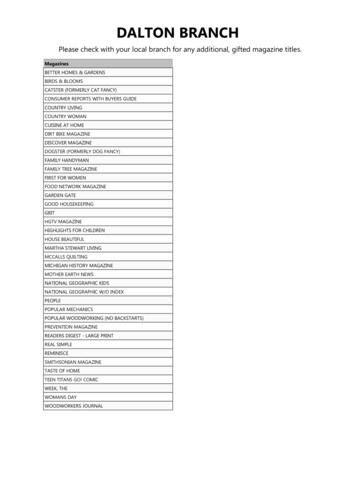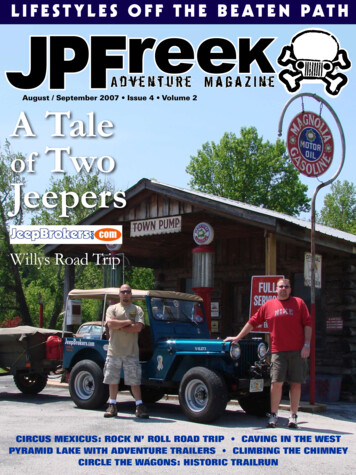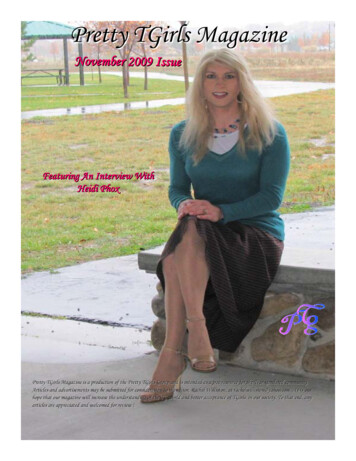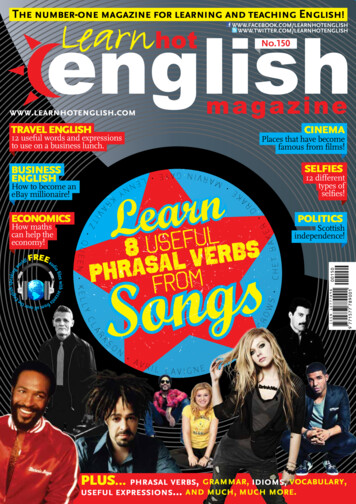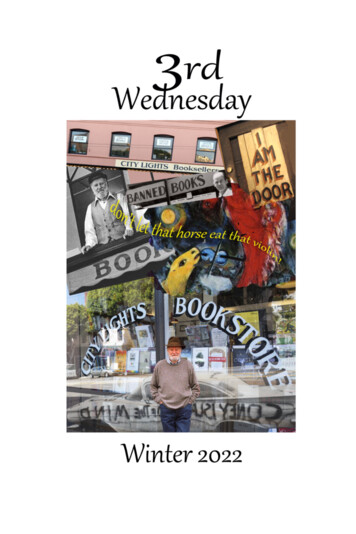
Transcription
1
Third Wednesday MagazineVolume XV, Number 1Winter, 2022Third Wednesday is a quarterly journal of literary and visual arts.Though we manage the magazine from Michigan, we welcomesubmissions from all over the world. Digital issues of themagazine are completely free to anyone and print issues can bepurchased at Amazon.com.Find us on the web at thirdwednesdaymagazine.org. There youcan download free digital issues, read the fine poems we havepublished in the past and find the link to our portal at Submittablewhere you can submit your work and subscribe to the magazine.You can also find and follow us on Facebook, YouTube, Instagramand Tumblr.MastheadDavid Jibson, EditorLaurence W. Thomas, Editor EmeritusJudith Jacobs, Art EditorJohn F. Buckley, Fiction EditorMarilyn L. Taylor, AssociateLynn Gilbert, AssociateCarl Fanning, AssociatePhillip Sterling, AssociateJoe Ferrari, Consulting EditorCover Art:No Strings AttachedDigital CollageDavid Jibson / Ann Arbor, Michigan2
Table of ContentsEditor’s Note for Winter, 2022.5Pearls / Corey Mesler.6Sculling on Tawas Bay / Richard Douglass.7Grand Haven Train / Kimberly Shyu.8Advice / Terry Belew.9Banana Wars / Gary Wadley.11Gibson House Window / Ann Privateer.14Peaches / January Pearson.15Edgar, Later (D. W. Griffith, 1909) / Nina Rao.16Autumn, Fall / Robert Nisbet.17Just Off the High Street / Robert Nisbet.18Branches and Windows / Christopher Woods.19In Margherita’s Kingdom / Cate McGowan.20That December / Peggy Hammond.21L’Amour / Jane Blanchard.22Must Be the Wind / Jack Granath.23Painting Woman / Rana Williams.24Time at the River / Mary McCarthy.25Dandelion / Leslie Schultz.26Formal Imitation / Mark Mitchell.27I Spent the Day in Armageddon / Emily Eddins.28To the Cats That Slink Out of Sight When I’m Walking in the EarlyMorning / Tom Large.29Lord, Just Give Me One More Spring / Grey Held.30It Was the Cauliflower That Kept Me From Sleep / Babo Kamel. .31When I Stop Being Her Daughter / Babo Kamel.32City Snow / Margaret Birth.33Sweeping Under the Rug / Gary Bloom.34Facsimile / Ruth Bavetta.35Light Likes / Ryan Brennan.35Plumbing / Sally Zakariya.36Walk, Swim, Fly / Sally Zakariya.37Salad Nicoise, 2019 / Sinclair Buckstaff.38The Seventh Age / Hattie Clarke.41Autumn, Departures / Robert Haight.42An Empty Field / Robert Haight.433
Angel of Death / Mary Stebbins Taitt.44Old Man Taking Account / Darrell Petska.45Everything Depends on the Day You Ask Me / Ronda Broatch.46Growing Gone / Kevin Brown.47Deer in the Yard / J. R. Solonche.49I Do Not Wish Them Ill / J. R. Solonche.50Interiors / David Chorlton.51Monarch / David Chorlton.52Away We Go / Robert Bulman.53Micro-sociology / R. A. Allen.54Landing in Is / Lily Jarman-Reisch.55Christmas Crow / Lynn White.56Think (Always) / Patricia Bingham.57Moth Wings / Laura Ann Reed.58Splintered White Picket Fence / Victoria Melekian.59Love Blind / Shannon Hollinger.60Do the Storms Still Reach You? / John Tustin.62Words / Gary Wadley.63Dad and the Gates of Hell / Ruth Holzer.64The Greyhound / Graham C. Goff.65Night Blizzard / Richard Schiffman.67First Love / Richard Schiffman.68Boot Jack / Donald Wheelock.69Being Born / Jeremiah Durick.70Clue of Home / J. S. Absher.71I Knew Bobolinko in High School / Kenneth Pobo.73Women These Days / Sarah Iler.74The Snake Man’s Lesson / Robert Fillman.75Team Captain / Virginia Smith.76Drawing 2 / John Loree.774
Editor’s Note for Winter, 2022This issue marks a substantial change in the way we publish 3rdWednesday. We look for ways to expose our contributors to an everwider audience, and beginning with this issue, the first of our 15thyear, each of the poetry pieces included was posted on our websitewith a brief biography of the contributor as the piece was selected.Our website is a busy place with lots of followers and traffic. Now,when someone lands on our page, the most recently selected piecesappear in a clickable list at the top of the page’s right hand column.In this way individual poems are getting hundreds of views and thechange seems to have spurred hundreds more downloads of freedigital issues of the magazine.This change makes it possible for contributors to share their workwith family and friends through links on their own social media.We actively encourage this. Spread the word, share the good newsand your fantastic work.The question arises, will publishing everything online before theprint issue comes out mean people won’t buy or subscribe to themagazine? The answer is we don’t know or care. We don’t careabout selling magazines or subscriptions as much as we care aboutour contributors being read as widely as possible.Okay, we have the worst business model imaginable and we’llcontinue to be bad at business for the foreseeable future.Enjoy this issue. We’ve put some nice things in it for you,including the winner of this issue’s 50/50 contest, Leslie Schultz ofNorthfield, Minnesota. Leslie served as guest associate editor forthe Winter 2021 issue.Next up, the spring issue will feature our annual poetry contestwhich will be taking entries until February 15th. We’re reallyexcited to have Keith Taylor serving as judge this time. Support uswith an entry.5
Pearls / Corey MeslerMy mother did not save much exceptmoney. She was not nostalgic.There are no drawings I did infifth grade, no old report cards, nofavorite toys. I miss my Matchboxand Corgi cars, my Beatles 45son Capitol, my old Mad Magazinesand Ripley’s Believe it or Notpaperbacks. All gone to garbagetrucks or garage sales. She handedlittle down. I have a couple of myfather’s WWII medals, but noneof his letters home. My mother gavemy wife her string of pearls. It isthis one gift I want to talk about.Tight with money her entire life shewas overly generous at the end. Mywife and I don’t go out much. Wedon’t entertain. But there was an eventwhere we dressed up, a speech Ihad to make. I found my old suit,purchased at the Salvation Army toget married in. My wife wore a simpleblack dress and upon the breast shelaid that single strand of pearls.They were like small lights, like prayerbeads, like dreamstuff. They were likemy mother, simple, surviving, hanging on.Corey Mesler / Memphis, Tennessee6
Sculling on Tawas Bay / Richard DouglassAugust 2021Glistening calm as the sun breaks over the far horizonNot a ripple, not a wave, not a crest or movementFaint late summer fog risingAs if the mass of water was silenced for a moment in timeStroking easily, 18 feet of ash wingsCatch, draw, pull, catch, repeat - rhythm of movementThe sliding seat in opposition to the draw on oarsThe touch of blade to waterBehind me a sweeping archMy wake, nearly delicate, marked on each sideParallel pools of disturbed waterBlade markers of my path, a pattern of my pastThe horizon now glowing with sunlightThe stillness on the shoreNow strays into morning,the moment has passed into a dayRichard Douglass / Tawas City, Michigan7
Grand Haven Train / Kimberly ShyuPhotographKimberly Shyu / Chantilly, Virginia8
Advice / Terry BelewYou should avoid staring at the sunduring an eclipse unless impulse consumes you.You should only think of childhoodafter eating hallucinogens.You should anticipatechemical reactions.You should never tell the patrolmanthere’s a gun in your trunk.You should act thankfulfor your speeding ticket.You should drive off slowly,then speed again because you’re late.You should change your oil, 10w30for winter and summer and anytimeYou should somehow translatethis to blessings, amen.You should remember that your parents triedgoing to a Methodist church beforethey divorced, how the elderlyreached out their hands.You should avoid blessingsbecause they are usually selfish.You should avoid stubbingyour toe on religious texts.9
You should avoid stubbingyour toe on living room walls.You should rememberthe time the grill caught fireand dad put water on it and the fire got worseso the vinyl siding melted.You should be grateful for your cheeseburger.You should always be happyfor your cheeseburgers. You should alwayslook in the rearview mirrorto make sure you are not leaking anything.You should get the tires rotated.You should drive awaybut mind what follows you.Terry Belew / Bland, Missouri10
Banana Wars / Gary WadleyThere is a long history of Gog and Magog: some say they wereindividuals, some say peoples, some say lands, but this is the truthand Magog would tell you the truth hurts.Gog lived in a valley and Magog lived on a nearby mountain. Theyweren’t much to look at – hairy and stinking with bad teeth, butthey lived mostly outside and had to hustle to stay alive. Theirmates looked about the same, only they had boobies.Gog and Magog got along fairly well, and only occasionally cameto blows. Gog was jealous of the mountain, because it was cool inthe summer, and Magog was jealous of the valley because it had anice river with sweet water for drinking and bathing. Each wantedwhat the other had. They were, after all, men.Every now and then Gog would climb the mountain or Magogwould descend into the valley and the two would drink thefermented juice of berries. At first meeting, they were happy to seeeach other and discussed mundane things like how many toes doesa sloth have or do birds go underground in the winter. They bothfelt that the fermented juice increased their intelligence, thoughthey could not have explained this.As they continued to drink the fermented juice, they would growangry and begin to fight. They would slap each other on the head(they hadn’t invented fists yet), but generally did very littledamage. Then they would both go home where their hairy wiveswould scold them by making clucking sounds, then pack mud ontheir cuts and bruises. They were both dense and their wives wouldhave divorced them, but divorce hadn’t been invented yet either.Fruit grew well in Gog’s valley, and one day he got an idea as hewas eating a banana: he would bring bananas to his next meetingwith Magog, and instead of slapping him on the head he wouldthrow bananas at him from a safe distance. Magog didn’t mind this11
(unless the fruit hit him in the eye), because bananas didn’t grow athigh altitudes and he would just eat them later. Thoughunintentional, Gog was sharing his food.Then one day banana season was over and Gog decided he couldalso throw squash and mangoes and avocados. True, Magog couldeat these also, but if you ever get hit with a well-thrown mango.well.it hurts!After a particularly heavy bout of increasing their intelligence withfermented juice, Gog threw a hard winter squash at Magog and hithim in the testicles. This is always funny on You Tube, but it’sreally not. No one would laugh at a woman getting smashed in theboobies. Like divorce, You Tube hadn’t been invented yet. Still,Gog fell on the ground laughing. Magog fell on the ground rollingin pain.“Awwwwwww,” yelled Magog (vocabulary was somewhat limitedthen). The sound echoed over the mountain and down into thevalley so that the women lifted their hairy heads and werefrightened. Even Gog grew frightened. It was like the sound ofbirth.Finally, Magog sat up, grabbed the first thing he saw (a rock) andflung it at Gog. It hit him in the head. “Awwwwww,” said Gog,then his eyes crossed and he fell face down in the dirt. Magogwaited, but Gog did not move again.Something had changed. Magog grabbed his mate and kids andmoved to a far-off mountain to hide. He didn’t know why, he justthought it a good idea. But it didn’t do any good.Gog’s mate and kids found his body and the killing rock andfigured out what had happened. It was if something else had beenlaunched along with the flying fruit and the rock. Maybe this iswhat Magog had sensed. It was in the air.12
“A little yeast leaveneth the whole lump,” Magog used to say as anold and unhappy man when he drank too much fermented juice. Noone knew what that meant.Well.you know the rest: arrows and spears, slings andcannonballs, television and politicians, gain-of-function researchand lawyers.La-De-Da.The Magogites still live in the mountains and the Gogites still livein the valleys. They still drink fermented berry juice, thinkthemselves intelligent, and throw things.Research indicates the root word Gog translates to your last name.Or maybe not.True story.Gary Wadley / Louisville, KentuckyGary’s story was an Honorable Mention from our recent GeorgeDila Memorial Flash Fiction Contest.13
Gibson House Window / Ann PrivateerPhotographAnn Privateer / Davis, California14
Peaches / January PearsonWhen a peach fallsfrom a tree, wrappedin its velvet shawl,plumped with juice,it reaches its pinnacle.How different for us.Slouching on the floral couch,my grandmother, 102, fiddlewith her blouse, wondersif someone will sewa button where she foundthree limp strings.Through the screen door,she watches woodpeckersshe can’t hear, her eara broken bell. She gumsa slice of white bread.What else is there to dowhen her insideshave come unstitchedlike an old cloth doll.Now, she has toppledfrom sitting position,her cheek flushagainst the seat cushion,limbs too heavy to lift,head sprouting white fuzz.January Pearson / Orange, California15
Edgar, Later (D. W. Griffith, 1909) / Nina RaoIn the gathering dark of her hairher dress is the last thing visible, whiteagainst a diminishing aperture.Everything else has been a construction.The lover or the envelope of moneyalways arrives after the heroine has died,in poverty, not knowing. He knows.He does not let anyone cut his hair.Around them the future is descending like snow,blanketing the cabin, although they don’t speak of it,or the way the starlings have gone silent outside.In nature there are no doors except thosewhich creatures cut into the fabric of each other.He thinks: when she is dead but thenall the verticals of the room go horizontalso he has to stop and begin again: when Iam dead but this is like staring into the dark,at night, sitting up in bed,trying to make shapes out of the living dark.In this he is continually distracted. Night,starlings, white dress and futuredescending like snow. There are things he seesonly in mirrors, or not at allNina Rao / Atlanta, Georgia16
Autumn, Fall / Robert NisbetSummer this year has ripened lustily,the growth, the green, the tubers, the blooms.We have known completeness.Emlyn has been working on his cottage,making it again a habitation and a home.In the dust and cement, in the mixing air,he has sawn and crafted, the planks,the dovetails, the taps and the wiring.In the fall Joan will be coming over,the American girl.When we sink into autumn, if you drivethe Aber road, passing below his cottage,Emlyn’s and Joan’s place now,you’ll see, on the hill’s flank,the gleaming of their evening lights,until they dip to darkness at elevenand the hibernating night, the turning year,will breed, brood.Robert Nisbet / Haverfordwest, Wales17
Just Off the High Street / Robert NisbetIn the Empire Cinema, a little Disney,Jungle Cruise. Then, the prehistoric Croods.Further along the High Street,Superdrug and clothing places, Gregg’s.Briefly, the lovely local Sheep Shop,before the Car-phone Warehouse, PC World,and somehow the sense that lingering near usis an age of haze, of spinning images,our lives in a global wrap.Rounding the corner, out of High Street,almost a dog-leg, to a semi-alleywayand small Victorian terraces. Here,in this one window, right by the pavement,perched on the sill, a globe,slightly dusty and I can’t quite seejust how much red is dotted roundits surface. In the room within(but hey, come on, hell’s bells,you don’t stare in at people’s windows),within well, maybe this a ghostly schoolchild, pointing a compass,dotting the globe, spinning it, intrigued,peering a way around its empires,its places and its fixity.Robert Nisbet / Haverfordwest, Wales18
Branches and Windows / Christopher WoodsPhotographChristopher Woods / Chappell Hill, Texas19
In Margherita’s Kingdom / Cate McGowanAfter the photograph by Mario Lasalandra (1967)Here, what cheer? The sorceress hears of hills that grow books.Jigs and rhymes—saddle-shoe lost time. Bleached crinolines,a photo’s chockablock hole-shots, faint letters pop-locked, unshook.Here, she spells sin, curses cliffs, bans noisome nooks,spindrifts brine, that gray grind, the old tides’ boss.Hear, what cheer, the sorceress hears of hills that grow books.There, a hedge-cloud. A noon shadow falls, hears no hook.Ring bells, carillons on-the-brook. Toll, tarot sorceress,a photo’s chockablock, hole-shots feint, letters pop-locked. Unshook.Here, she spiders cobwebs, quivers maps, witch silk unspooked.Hear spooled jetties, tide pools, tadpoles that churn and tosshere. What cheer, the sorceress hears of hills that grow books.Hear tall-tales she tells, spills such terms, such sorcery cooks.Here, rhymes aperture, don f-stop chokers. Le juju albatross—a photo’s. Chockablock hole. Shots, feint. Letters pop, locked, un.Shook.Hear libraries spout gibberish, all manner of gobbledygook.See. Have a look. There, there, tossed contrapposto, criss-crossedhere. What cheer the sorceress hears of hills that grow books,a photo’s chockablock hole-shots, faint letters pop-locked, unshook.Cate McGowan / Maitland, Florida20
That December / Peggy Hammondbegan with no warningof endings. Chilled mornings,frost, white and shining,crystallized grass crunchinglike bones beneath our feetas we ran for the bus,mothers’ thin voices trailing us.Streaming through tiled hallways,diverging like rivuletsinto pools of classrooms,we peeled away coats,feeding them to open mouthsof cubbies crowned by nameson blue plastic strips.Teachers herded us through lessons,excitable colts, bucking, prancing,our wild eyes flitting to salvation,a red and green poster counting downdays to Christmas break.Finally the last day.Standing beside you, your voicesoftening on my name, untamedblack hair, lopsided smile,brown eyes kissed on one templeby a tiny scar, a waning moon.How much vacation had passedwhen the call came? Your cousin,his father’s gun, shiny, tempting.How he didn’t know it was loaded.How a bullet violated your slender throat.21
At forty-three, I visit your faded gray stone;my eyes trace lichen-filled linescalled for an angel, aged eleven,linger on the etched lamb,all the nevers of your lifewoven in its tender wool.Peggy Hammond / Arden, North CarolinaL’Amour / Jane BlanchardFrench lore maintains a hazel treelikes extraordinarilyto have a honeysuckle vinegrow near enough to intertwineso that the latter comes to lovethe hold the former has dreamed ofand neither wants to live withoutthe other very close about.Jane Blanchard / Augusta, Georgia22
Must Be the Wind / Jack GranathYou clean buildings at night. Solitary work with a mop bucket onwheels that creak. It’s one o’clock, three o’clock in the morning,and a toilet flushes or the elevator rises. Of course, the buildingsits on an Indian burial ground. There is the story of the nun. Theowner being frugal (and elsewhere), the lights are kept off exceptfor every fifth fluorescent. One of them trembles as if shaken byfootsteps upstairs. You would be frightened if it weren’t for thethousands of other nights on the job. Still, you do avoid elevatorsbecause of the way the doors open, and anything could be there. Inall those years how many sounds did you identify? A few brokenfan belts and rattling pipes. Only once did you trace a crash to anintruder. You shouted, “Hey!” and the next day they called you ahero. Later that same year, a short circuit in the silent alarmbrought three police officers with their guns drawn. Nobody calledyou a hero then. In one building the boss’s son romanced hisgirlfriends in dark offices and made clinking sounds with bottles,but that was easier for you. That was known. Except for the onetime, when you learned later that he hadn’t been there, had beenout of town all week. But the sounds are never the worst. Halfghost yourself, you are not an occupant, so they set the HVAC tounoccupied. You wear gloves with no fingers in winter. You haveseen your breath in basements. And then, shivering in that cold,you move through a warm spot in an empty hall, no explanation.In summer it’s the opposite. You sweat and sometimes wipe yourbrow with a greasy rag and just then feel a coolness on the back ofyour neck like the mist from an eldritch waterfall. It doesn’t last.You are seasoned. You have known a thousand scurryings, theindisputable clank of chain, the warm spot and the cool spot. Still,you do avoid elevators. And when you dig through the largecanvas basket full of rags and come up against something solid thatshouldn’t be there, you do draw back and take a breath beforeinvestigating, before you ascertain: long-lost flashlight or humanhand.Jack Granath / Shawnee, Kansas23
Painting Woman / Rana WilliamsPhotographRana Williams / Hayesville, North Carolina24
Time at the River / Mary McCarthyWhere dragonflies make quick stitchesin a crazy quilt pieced of sweetevening blues, each shadea reflection of memory;some like pale silk, smoothas a bride’s wedding train,some plush and thick as velvet,others full of light, winkinglike sequins on dark cloth, or sunlightglinting off the rimsof a thousand small wavesHere my thoughts move slowas a hand stroking rich fabric,acknowledging each stitch,each odd shape made to fit my days,and though this patchwork growsto cover the riverand blanket the sky,I know when I have had my fill of silenceit will fold up small enoughto carry back with meinto the noisiest narrow room.Mary McCarthy / Edgewater, Florida25
Dandelion / Leslie SchultzTaproot half-burrowing under pavement;scorned by gardeners seeking flawless lawns,showier blooms, more sweet, succulent fruit;named “dog pisses” by Italian housewives(messy yellow puddles near tidy streets);still you offer every sharp excellence .to the discerning eye and utile-aligned mind.Your roasted root? A coffee substitute.Your leaves? Delectable fried or steamed.All of you, ground, makes a blood-tonic tea,diuretic bitter herbal. Eventhe leaky latex of your pink-green stems,so bitter on an unsuspecting child’s tongue,has commercial value, might someday yieldaccessible, perennial rubber.Today, o maligned yet excellent plant,I come to praise your keen-toothed survival,your sheer, tough doggedness, your seasonaltransformation from compact golden sunsto silky-silvered parachuting moons.Leslie Schultz / Northfield, MinnesotaLeslie’s poem is the winner of this issue’s 50/50 poetry contest. Shewins a check for half the entry fees and a one year subscription tothe print edition of 3rd Wednesday.26
Formal Imitation / Mark MitchellOnly to hearthe call of a foghorn.we cuffed you in bridges.San Francisco singsunder a masked moon.Only to heara foghorn’s silver call,your hills tense, shake, shrug.San Francisco sighsindifferent as a found cat.Only to heara moon call from foghornswe conjure the flesh songsfrom all your haunted houses.Mark Mitchell / San Francisco, California27
I Spent the Day in Armageddon / Emily EddinsI spent the day in ArmageddonThe blood-soaked skyMaroon noon dark as nightThe evening frogs, confused and chirpingWe stumbled aroundIn our N95 masksGasping for fresh airSubmerged in smokeI carefully strapped a filterOn my youngest childBefore he went outside toBreathe the ash floating likeFlakes of snow andSnap pictures to shareOn social media“Look at this strange day!”The caption readHis childish enthusiasmSmashed my heartAs if we were tourists to climate changeInstead of permanent residentsI guess it was sort of likeThe Grand CanyonYou had to see it in personTo capture its immensityAwe-inspiring angry earthOn fire and flashing redA warning light to say good nightGlaring hot and obviousTo those in mourning.Emily Eddins / Atherton, California28
To the Cats That Slink Out of Sight When I’m Walkingin the Early Morning / Tom LargeDear furry darlings, I don’t mindwhen you slip into the shadowsand Ignore my warmest greeting.If you have been disturbedin the middle of some amorous pursuit, I apologize.To be caught when the lights come oncan be embarrassing.Who wouldn’t leap up and out of sight?And if you were just about to eatthis fresh-killed furry thingI’m stepping over on the sidewalk,I’m sorry to interrupt your meal.I hate settling down to dinnerOnly to have the doorbell ring.Of course there is no obligationthat you be warm and welcoming,but if you’ve spent the night locked out,irritably meowling round the neighborhood,and no one let you inI’m someone you could turn to now,a leg to nudge your head againsta hand to gently rub your ears,all given with great respect,absolutely no strings attached.Tom Large / Baltimore, Maryland29
Lord, Just Give Me One More Spring / Grey HeldLet me enter the backyard tool shed’s faint dark,take in rich rank smells of mulch,whiffs of gas fumes from the tanI’ll tilt to fill the mower’s throat.Let me feel the demanding handles of hefty shovels,the rough shank of my old rake,the flat tires on my wintered-over bike,the chains’ stiff links craving oil.Let me gorge myself on chores:fix the spigot’s drip, patch sidewalk cracks,replace the split picket on the rickety fence,tighten the loose lip of the brass latch,scrub the musty beach-chair webbingwedded by rivets to the frame,fill holes dug by snakes and moles in the curved berm.Let the crows come back,hawking their caw-caw-caw on power lines.Let tribes of tiny ants line up troops by the driveway.Let maple pollen wallow all over the windshields.I’ll take it all—invasive vines twiningthe trellis, grass grubs, rain-riven gutters plugged.Grey Held / Newtonville, Massachusetts30
It Was the Cauliflower That Kept Me From Sleep / Babo Kamelhovering like a strange off-white brainescaped from the failed autopsy of a poemin my sixth grade classroom filledwith budding bullies. And that poor boywho stuttered through every presentation,his face like a pomegranate left too longin the sun reading out loud the first verseof the Highwayman getting stuck at ridingnever making it to the old inn-door.The bigger boys at the back snickeredwhile we girls looked down wishingthat moment would flit above our heads,to fly out the window. Like a shadowed thingmy grandmother once chased with a broomshouting fledermoyz, a bat! My twin brothersscreaming on cue from their cribs.One of whom called me tonightfrom the one room apartment his lifehas become. We speak each day and replaythe past in which he resides. Lithiumturning the days into a fifty year doze. He lovesmusic, though, and sits outside his buildingsinging Carole King songs to himself. And whenI ask him if he talks to any of the other residentshe laughs and tells me he can’t waste his timediscussing the price of oranges or a sale on soap.Instead he studies Torah on taped recordingsfrom 1988, rocks in his chair. Tells mehow much he loves reruns of Rosanne. Recitesall the dialogue, the way he used to mid
Third Wednesday Magazine Volume XV, Number 1 Winter, 2022 Third Wednesday is a quarterly journal of literary and visual arts. Though we manage the magazine from Michigan, we welcome submissions from all over the world. Digital issues of the magazine are completely free t
